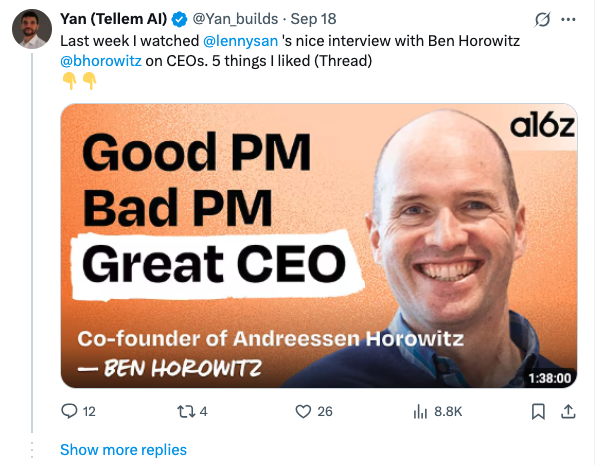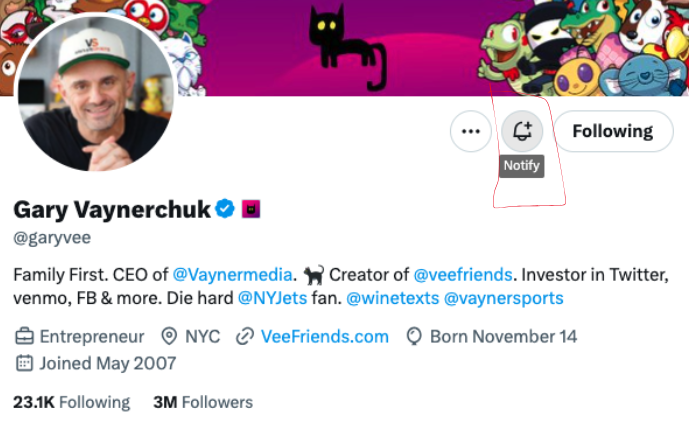
I started from 0 and I'm currently growing 150+ followers per week on X. Some do better, some do worse, but that’s not the point
As a founder building Tellem AI, I realized that having an audience wasn't optional anymore—it's essential for customer discovery, product validation, and ultimately, business growth. And it's not specifically linked to your actual business, you will leverage this your whole life.
A part of my potential customers (Founders & marketers) are on X so I went on X as well.
But here's the thing: I hadn't been on X for a while. So I did what any obsessive founder would do—I studied the playbook of everyone who's actually crushing it on X. Here's what I learned, what worked, and what definitely didn't.
Let me be brutally honest: I initially thought X was just a place for hot takes and arguments. I was wrong. It has become the de facto networking hub for the startup ecosystem. It's where:
The ROI became clear when I started getting inbound leads, partnership opportunities, and valuable connections just from being active on the platform. Linkedin is great too, but start to be very crowded.
Before posting anything, I had to fix the basics. Can seems obvious but some accounts don't do it the good way. Here's what the successful founders taught me:
My original bio: "Founder at Tellem AI." My current bio: "Ex- HubSpot, ex salesperson & marketer. Helping founders scale faster with AI-driven marketing. Sharing the playbook as we build Tellem AI from 0 → 100K MRR"
The difference? Specificity, personal presentation and social proof. People need to understand what you do in 5 seconds, not 5 minutes.
Professional headshot > logo. People connect with people, not brands. I learned this the hard way in other businesses after weeks of terrible engagement with a company logo.
After analyzing hundreds of successful founder accounts, I found patterns that work consistently:
Try content that sounds personal but is actually designed to drive curiosity about what you're building. Example :

I'm softly selling my content marketing SaaS without selling it directly.
1. The learning thread Share something you just figured out. Example: "I just spent 3 hours analyzing our churn data. Here's what I learned about why users actually leave SaaS products..."
It can also be content curation. I did it with an episode of "Lenny's podcast" with Ben Horowitz :

2. Contrarian takes (But make them smart) Challenge conventional wisdom with data. "Everyone says 'build in public' but 73% of founders I surveyed say it actually hurt their early sales. Here's why..."
3. Process breakdowns Show your actual workflow. "How I validate product ideas in 48 hours without building anything..."
4. Metric transparency Share real numbers. "Month 3 update: $2.4K MRR, 89 users, 23% churn. Here's what's working and what's not...". People love numbers.
The successful founders I studied post 2-3 times per day:
Posting times can change, but overall, consistency beats perfection. I'd rather post something decent every day than wait for the perfect tweet once a week.
This was my biggest learning curve. X isn't a broadcasting platform—it's a conversation platform.
Try this :
> 2 posts/day – one sharing a genuine idea or insight, one informational, one establishing authority
> 30 comments/day – start with smaller accounts first, they'll reply to you
> 2 posts/day in communities where your ICP is
> 5 comments on big accounts – pick big accounts your ICP follows and set up notifications for their posts, so you can be among the first to engage

Example of a post when I interacted with a small account, I tried this on the GEO (AI search) topic:

For every 1 post about my company, I share 5 posts that help other founders. This builds goodwill and positions you as someone who gives before they get.
When you can, end your comments with questions. Instead of "Here's how we reduced churn by 30%," try "Here's how we reduced churn by 30%. What's your biggest retention challenge?"
Over-promoting our product: Early on, every other tweet mentioned our product. Engagement tanked, and I actually lost followers.
Generic motivational content: "Monday motivation" tweets perform terribly. People follow founders for specific insights, not generic inspiration.
Arguing politics: I know, I know—it's tempting. But unless your business is directly political, it's a distraction that alienates potential customers.
Inconsistent voice: I tried to be too professional early on. The content that performs best is when I sound like myself, including the occasional frustration or excitement.
As you grow, you need systems. We are building Tellem AI exactly for this (See our Content Growth cycle article) and I will use it when it will be ready.
But here are the steps everyone follows to create content :
Today I use a simple Notion database to track:
Without scheduling the posts in advance, it's IMPOSSIBLE to stay consistent. So I schedule content but I post personal updates when I think about something in my day.
I track:
The most successful founders don't just build audiences—they build communities. Here's how:
Instead of random tweets, create mini-series. Someone I know did a "7 Days of customer interview insights" thread that got massive engagement and positioned him as someone who actually talks to customers.
When someone asks a question in your expertise area, provide a thorough, helpful response—even if they're not a potential customer. This builds reputation and often leads to unexpected opportunities.
Introduce people in your network who should know each other. This makes you a valuable connector, and people remember that.
Building an audience is not a growth hack—it's a commitment :
But here's what makes it worth it: The relationships you build become your greatest business asset. Customers, co-founders, investors, advisors—they all come from your network.
Monday: Plan & schedule content for the week based on what happened in the business
Tuesday-Friday: 1 hour engagement per day. I try to engage with at least 30 people per day.
Monthly Review: Analyze what content performed best and why, adjust strategy accordingly.
Building an audience on X isn't about becoming an influencer—it's about becoming known for something valuable in your space. For me, it's sharing the real, unfiltered journey of building an AI marketing tool for small businesses. Talking about AI agents.
The best part? Every follower represents a potential customer, partner, or advisor who chose to hear from you. That's not just an audience—that's a competitive advantage.
What's your biggest challenge with building an audience? I'd love to hear about it—DM me on X @Yan_builds and let's figure it out together.
If you are interested into having a system to make AI works for you and create quality content way faster, just try Tellem AI